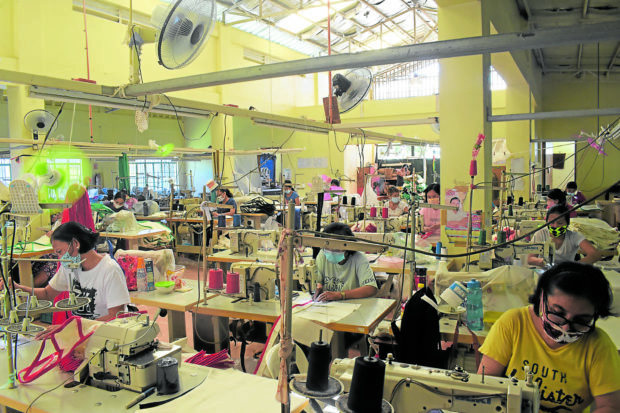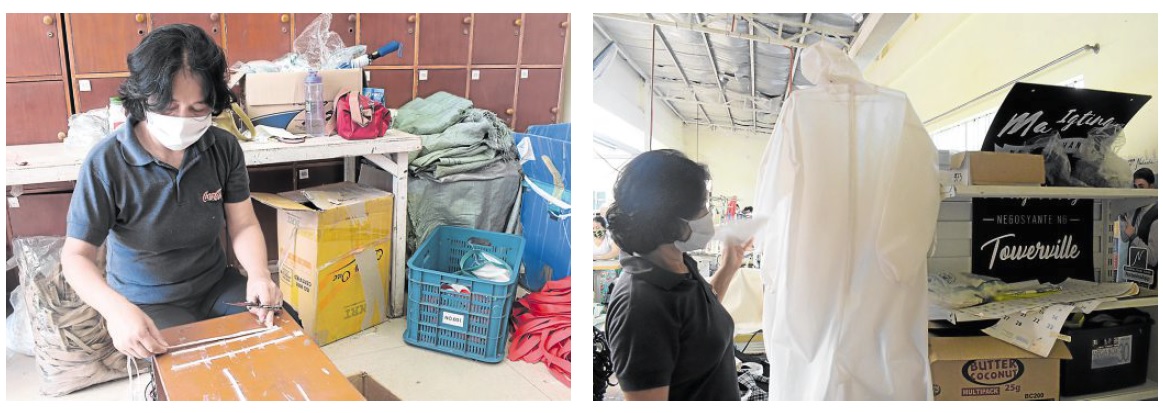Band of sewers suits production to pandemic

BAGGING IT A sewing center run by a group of mothers in Towerville, San Jose del Monte, Bulacan, also produces ecobags. —JANE BAUTISTA
A crisis that became a blessing was how a group of female sewers in Towerville, San Jose del Monte, Bulacan, described the COVID-19 pandemic.
When the shopping malls closed and a lockdown was imposed in March, Rowena Osal, project head of Igting (or Maigting na Samahan ng mga Panlipunang Negosyante ng Towerville), felt like she had fallen to the ground, hopeless and uncertain of the future.
Igting stopped operations on March 15. “The mothers kept asking each other: What now? Where will we get our resources?” recalled Osal, or Nanay (Mother) Weng.
But just after a month in quarantine, the Center for Asian Mission for the Poor (CAMP) Asia, a nongovernmental organization (NGO) that has been supporting Towerville since 2010, decided to engage the women in the production of face masks and personal protective equipment (PPE) to be donated to medical front-liners and hospitals as part of its COVID-19 response.
“They came to my house and discussed the planned resumption of our work. Right then, I was grateful and my heart became full,” Osal said.
Article continues after this advertisementSoon after the meeting, the mothers returned to production, their sewing machines whirring from 8 a.m. to 5 p.m. As of November, they have produced a total of 300,000 face masks and around 17,000 sets of PPE that were distributed to various institutions.
Article continues after this advertisementThe project was implemented in cooperation with the Korea International Cooperation Agency (Koica) and CAMP Asia as part of the Korean government’s “Stay Strong, Build Trust Together” campaign led by Korean Ambassador to the Philippines Han Dong-man.
Currently, CAMP-Igting is prepping for a small crowdfunding project in which pouches containing three disinfectant sprays and three face masks will be produced. The women are in charge of the masks and pouches, and CAMP of the sprays.
A long way back
Said Buyoung Cho, staff member of CAMP Asia: “If we achieve this project by getting the fund, we will deliver safe and lovely packages to the supporters. The income/funds gathered will go to Igting for Christmas gifts as well.”
Igting’s story of success goes a long way back to how the Towerville residents started from scratch.
Towerville is a relocation site for urban poor families who set up house under bridges and other unsafe areas, or sites of government construction projects. Osal’s family, for one, used to live on the riverbank of Marikina City along with 200 others.
When Typhoon “Reming” (international name: Durian) devastated their area, causing the death of her own brother, Osal decided to move to Bulacan despite the lack of schools, hospitals, and even livelihood sources in their area.
Osal used to be a sewer in a factory in Marikina. She held on to her job there even after her family moved, until she realized how difficult it was to also look after her children and tend to their needs.
In 2010, a survey group from CAMP Asia came to Towerville asking the residents what kind of livelihood it could start there. Osal quickly answered, “Sewing,” and as it turned out, the other women responded in the same way.

QUALITY CONTROL Work at the sewing center in Towerville, San Jose del Monte, Bulacan, entails cutting garters for face masks and checking the finished personal protective gear for front-liners. —JANE BAUTISTA
And so Igting was born. With the help of the NGO, the women were given training at the Technical Education and Skills Development Authority to develop their skills and prepare them to eventually manage their own social enterprise in the community.
The local government also provided help in the beginning, offering training courses. But that’s just it, Osal said, adding: “If you are poor and you have no money to start your own business, it’s difficult. Yes, you learn something [from the training], but it’s not enough.”
Armed with the training provided by CAMP Asia, the women partnered with the University of the Philippines’ Department of Community Development (CD) for empowerment and for Igting to be “a self-managing organization.”
Committee systems in their group of 40 members were developed: Production, training, membership, and community affairs, to ensure that work will be participatory, said lecturer Isaac Linco, one of the first four CD majors back then who helped the women of Igting.
P250-P350 a day
Koica provided funding for their materials, sewing machines, equipment, and even the building of their sewing center. Their first production involved school uniforms for the daycare center also founded by CAMP Asia in Towerville.
Before the pandemic, the Igting sewers were making ecobags and backpacks, which provided them an income of P250-P350 a day. They operated under the piece-rate pay system, in which their earnings depended on the number of pieces they produced.
“It’s nowhere near the minimum wage but the convenience of having a source of income inside your own community, where you can still look after your family or go home during breaks, is there,” Osal said, underscoring the importance of a mother’s presence in a home.
‘Nanay made this bag’
They also made their own products—usually displayed at market fairs in shopping malls—such as pouches, laptop and cell-phone sleeves, and bags with the tag “Nanay made this bag.”
The blessings to the women during their COVID-19 production made it possible for them to earn P4,000-P5,000 a week—a windfall compared to their highest prepandemic pay, which amounted to P2,500 at most.
For all the income and opportunities the sewing center has provided for more than a decade now, Osal is most grateful for the development in her character. “I felt empowered and capable of doing great things because they guided me and trained me,” she said.
The success in empowering Igting members is evident in how strong their organization is, Linco said. “If you look at [Igting] as a model of social enterprise, [you’ll see that] their strength is really on the ownership and participation of the people.” INQ